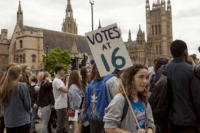
We must involve young people in political decision-making
In the first article of a new series of cross-party reflections on young people and politics, Baroness Massey argues that we need to find more ways to immerse young people in the processes of politics and democracy.
An article in a newspaper this week, suggests that the BBC is at risk unless it can attract young audiences. Commercial rivals are the problem. Could there be an analogy with politics? Are politics boring, or is it their negative image that many young people do not find attractive?
This may be part of the problem of engaging young people. I suggest that it is more complex. I suggest that political parties and structures are not involving young people in politics from a national to a local level. As adults, they are then indifferent and disillusioned. A turnout across the UK of 68.8% at the last election, and low at local elections reflects this.
I went into a school recently as part of the House of Lords Speakers in Schools scheme. I talked to a class of 15 year olds and then divided them into small groups to formulate their own 6 questions for me. They wanted to know "Have you met the Queen?" and "How much do you earn?" (the concept of expenses was difficult to convey!). But there were also questions such as "Why did you go into politics?" and "Do you think 16 year olds should have the vote?" They cheered when I said yes. "What are you most proud of in your work in the Lords?" I said supporting children's rights generally and helping to defeat the Section 28 law to forbid "the promotion of homosexuality". There was real curiosity and interest and a good discussion followed.
Many MPs, Peers and local councillors visit schools – both primary and secondary to talk about politics and their role in it. Thousands of young people a year are escorted round Parliament. Many schools carried out excellent projects related to the Magna Carta anniversary in 2016, helped by excellent resources for the Parliamentary Education Service. Many have been involved in work on the Suffragettes this year. This all helps young people to learn about aspects of politics and is stimulating and worthwhile.
My question is – are they inspired enough to take a deep interest in politics from such activities? Some probably are? How could we take this further? It seems to me that, in order to develop a commitment to politics they need to be immersed in the processes of politics. Schools have school councils where classes elect representatives and meet, with a teacher – sometimes the Headteacher – present to discuss and vote on issues such as school rules, meals, activities in and out of school.
Young people increasingly form panels in organisations to discuss and contribute to decisions about aims and functions. They have a real voice in many Non Governmental Organisations, and the office of the Children's Commissioner for example. Some police forces have young people's forums to discuss how better to improve laws and relationships. By such means, young people learn how business is done, how democracy works (or doesn't), they learn that people, including young people, have rights and responsibilities. We have a Youth Parliament, we have Young Mayors. We need to use them to gather young people and politicians together to share ideas and target and listen to those who are not usually involved.
The United Nation Convention on the Rights of the Child, (the child is defined as 0 to 18) which the UK has ratified, includes the right to freedom of expression and a say, by children, in issues which affect them. The Council of Europe Strategy for the Rights of the Child provides guidance on how to embed child participation in practice.
How could these ideas apply to the UK when we ask how political parties can appeal to the next generation of voters? In several ways, I think. Make it clear that:
- children have rights, that children can be involved in influencing and making a difference for the better in institutions
- listening to children, helping them to be involved in systems empowers them to feel that they matter in society
- encouraging their participation at local and national level through contact with MPs and political systems
- reach out to those young people who feel disenfranchised and disillusioned
The one suggestion I would make is that some organisation should do a trawl of the good practice which exists in involving young people, helping them to participate in a meaningful way and encouraging them to make a difference to society.















